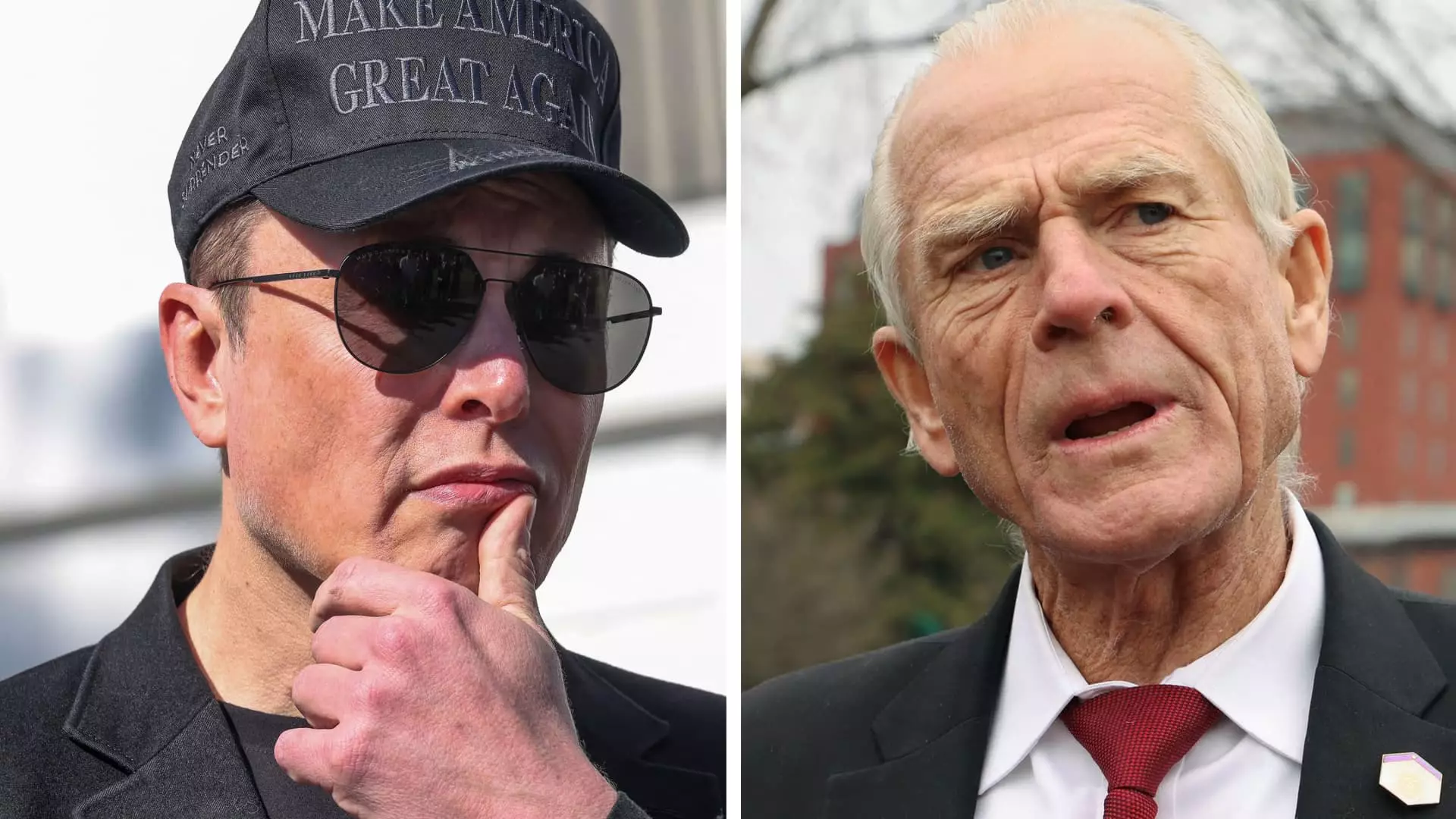In recent times, as Tesla shares consistently declined, CEO Elon Musk found himself embroiled in a public spat with Peter Navarro, Trump’s economic advisor. This confrontation not only highlights the growing tensions within the political and economic spheres but also serves as a microcosm of the serious frictions impacting the global trade landscape. Musk’s defiance against Navarro’s economic insights showcases more than a personality clash; it unearths critical facets of inadequate diplomatic trade policies and their consequences for American businesses. The stock market’s deterioration simultaneously underlines a dangerously volatile economic environment—one in which influential figures like Musk and Navarro are unwittingly contributing to an escalating crisis.
The Price of Tariffs
The recent imposition of steep tariffs on over 180 countries has sparked uproar within Trump’s inner circle, as illustrated by Musk’s blatant hostility towards Navarro. Musk’s assertion that economic experts like Navarro are “truly morons” echoes a broader concern regarding the suitability of current trade policies. Although tariffs aim to protect domestic production, they often backfire by inflating production costs and driving established businesses into deeper uncertainty. Extending a 25% tariff on vehicles not assembled in the U.S. seems a surefire way to cripple companies reliant on international supply chains, while simultaneously burdening American consumers with higher prices.
After the implementation of these tariffs, Tesla’s production costs have seen an upward trajectory, pressuring its bottom line. What Musk and those in his camp seem to overlook is the harsh reality that tariffs harm the very businesses they purportedly aim to protect. By escalating consumer prices and stifling competition, tariffs restrain market innovation and organic growth. Thus, Musk’s entanglement with Navarro may function as a glaring representation of a failed strategy that could undermine Tesla’s future success.
The Weight of Influence
Musk’s fierce rebuttal against Navarro also carries broader implications for his personal credibility and influence on economic policymaking. By undermining Navarro’s expertise with crude barbs, Musk diminishes his own stature as an astute leader in innovation and technology. If the world’s richest person can casually dismiss multi-academic achievements like a Ph.D. in economics, it raises questions about the value he places on expert opinion within the economic landscape. In many ways, this attitude stalls essential discourse that could illuminate sounder paths for trade relations, particularly in complicated markets such as Europe and North America.
Musk’s pointed criticisms juxtapose with the mounting losses Tesla has experienced—over $585 billion evaporated this year. While it may showcase an attempt to project confidence in turbulent times, the reckless abandon with which Musk engages in these spats risks framing him as an adversary of rational economic discourse. His call for a zero-tariff environment across the Atlantic, while appealing to some, appears naïve in the landscape defined by self-serving political motivations.
Competing Visions for Trade
Amidst his ongoing battle with Navarro, Musk has exhibited a tension between the innovation-driven world of tech entrepreneurship and the archaic mindsets that often dominate traditional trade policy. As the leader of companies that thrive on speed and efficiency, Musk advocates for the dissolution of barriers to commerce. In his ideal realm of operation, free trade would fuel competition and advancement. However, by sparring with Navarro, he underscores the deep ideological divides between those who wish to expand trade and those who adhere to protective measures, despite obfuscating their effectiveness.
His broader implications and ideas require serious engagement from political leaders who seem more preoccupied with maintaining the status quo than seeking collaborative solutions that facilitate genuine growth. Musk’s outspokenness, while unscripted, raises essential questions about the kind of economic future being forged in the shadows of personal vendettas and political grandstanding.
The Emergence of a New Economic Normal?
In the wake of these developments, one must consider the alarming trajectory of the American economy. Musk’s persistent challenges against an elevated and often incoherent trade policy spotlight not just the detrimental effects of tariffs but also the fragile nature of the contemporary market. Companies like Tesla, once lauded as emblematic of American ingenuity, could find themselves pushed to the brink by entrenched political power plays.
As the nation grapples with the disconnect between policy and pragmatic economic needs, it becomes apparent that diverging visions concerning trade and tariffs cannot exist in isolation. Musk’s rants are indicative of an escalating battle between innovation and bureaucracy, one that needs resolution for a thriving economic future. In a world where the stakes are incessantly high, failing to confront these misalignments may yield dire consequences—not only for Musk but for every American ultimately involved in the economic web.

